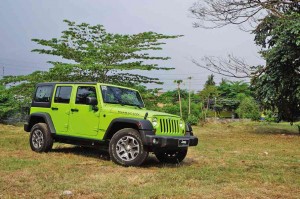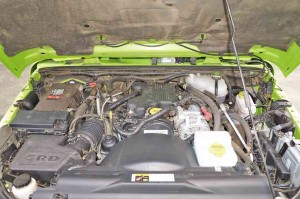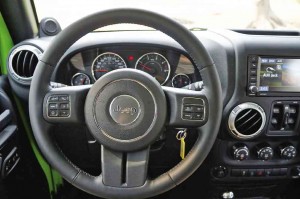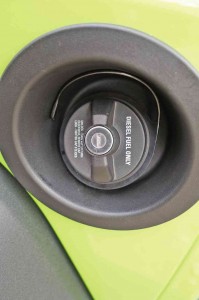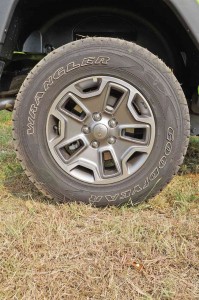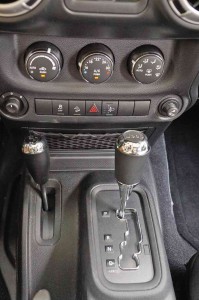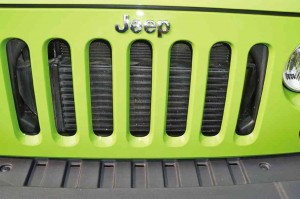Jolly Green Jeep
Purpose-built offroad vehicles don’t really appeal to me. Most of the offroad driving I do are over dirt roads, farm-to-market roads, and Edsa. I also hate getting dirty, particularly my shoes (I have a shoe fetish). The non-smooth roads I drive on are surfaces, which even most street/tarmac oriented SUVs and pickups can handle without batting an eyelid.
So when I got a call asking if I’d be interested to test-drive a Jeep Wrangler I immediately said yes, without even thinking about what I was getting myself into. I thought to myself: This was like peeking into the other side of the looking glass, experiencing something new, foreign, alien and potentially disastrous but memorable nonetheless.
So a few days later, I pick up the Jeep, and despite announcing its presence to the entire world with its Gecko Green paint, it was not the easiest of meetings indeed. For a start, the door is a tad narrow, even if it is quite tall. Getting in without the help of a side step rail is difficult enough, but landing into a small seat (short seat base) is more so. With an awkward driving position that has the low dashboard set very near your torso, the Jeep isn’t the friendliest of vehicles for me. The lack of telescopic steering wheel adjustment, and the small pedal box meant that I had to sit as close as possible to the steering wheel, and my size 11 EEEs kept bumping into the bottom portion of the dashboard so I couldn’t always floor the throttle whenever the road opened up ahead.
But now, as I wrote this review, a few weeks after I’d returned the Jeep, and I find myself missing it quite dearly. It is, the automotive offroading equivalent of, say, a Porsche 911 GT3 RS, a Lamborghini Gallardo LP570 Super Trofeo Stradale, BMW M3 GTS/CRT, or a Mercedes-Benz SLS AMG Black Series. While the latter vehicles are all low-slung, track-biased cars barely legal for road use, the Jeep is perhaps the ultimate offroad adventure vehicle fresh out of the box.
The standard specifications read like offroad porn: Rock-Trac 4WD system with a Rock-Trac NV241 OR low-speed transfer case with shift-on-the-fly technology, Tru-Lok front and rear locking differentials, front and rear anti-sway bar disconnect systems, Dana 44 heavy-duty front and rear axles, monotube gas-pressurized shock absorbers powering the four 245/75R17 Goodyear A/T (all-terrain) tires on 17X8-inch cast-aluminum wheels. Change the tires to proper M/T (mud-terrain) and you’ve got one awesome mud-plugger.
Hidden treasures
Sheepishly, I have to admit that although the Jeep came packed with every offroad enabling device on the planet, I didn’t have the time to get down and dirty. But that didn’t mean I could not enjoy the Jeep’s other hidden treasure: the 2.8-liter CRDi equipped inline-4 with dual overhead cams and 16-valves, turbocharged and intercooled for serious offroading duty. On the road, the 200-hp engine seemed a bit flat, lacking much top-end pull, although the 460 Newton-meters of torque meant that peeling out of corners was a possibility if I had enough lock on the steering wheel to overpower the 2-ton beast.
The Jeep also comes with a removable Freedom Top Hard Top, a plastic targa-style roof which provides an al fresco motoring experience in the wild. There’s a military-grade fabric soft-top included and folded out of the way called the Sunrider Soft-Top, which can provide protection from the elements. Admittedly, the Freedom Top did an almost sub-par job of insulating the interior of the Jeep in Metro Manila’s almost 40-degree peak ambient temperatures, and there was much wind buffeting inside the Jeep even at speeds above 100 kph, the hard top perhaps not able to seal the roof completely. A hack might call it a fault, but I’m sure enthusiasts would call it character instead.
Sense of indestructibility
The ride is surprisingly jelly-bean compliant: it didn’t obviously have the last word on responsiveness, grip and turn-in ferocity, even when compared to other SUVs. But the Jeep had a sense of indestructibility that I often found myself going straight for the rough stuff on Edsa and watching in awe as the Jeep’s suspension pummeled these surface imperfections to oblivion and subservience. The brakes were surprisingly powerful and accurate, providing surprisingly good feel and feedback through sometimes somewhat mushy pedal.
In traffic, on the urban jungle, the Jeep impressed immensely. People stopped and stared, pointing at the Jeep’s unmistakable military-based origins. I have far more respect for the Jeep compared to, say, a Hummer H2 or H3 as the Jeep possesses true ability, and surprisingly good on-road driving manners and performance. In cut and thrust driving, the low-down torque means you can always nose ahead and be the first to make the turn, cross the intersection or sneak into a queue. The Jeep, indeed, is worthy of respect.
I did try to do a bit of offroading and found a small vacant lot with rippled surfaces, small mounds, some grass and loose dirt. I immediately found the jeep making rooster tails of dirt and mud as the 2.8-liter engine delivered amazing torque to send dirt flying mid-air. With the automatic transmission’s willingness to hold gears even when the tires were slipping and sliding, it was lots of fun. More importantly, the Jeep would be a truly capable offroad machine in the hands of the right driver.
I love the Jeep, and I do admit to missing it on those odd days when everyone wants to bully me in my small dinky hatchback. Or when a huge obstacle is right in front of me. Or when I just want to bully other motorists driving other bully worthy SUVs and trucks on the road. Even the missus found the Jeep one of our more interesting rides to date.

